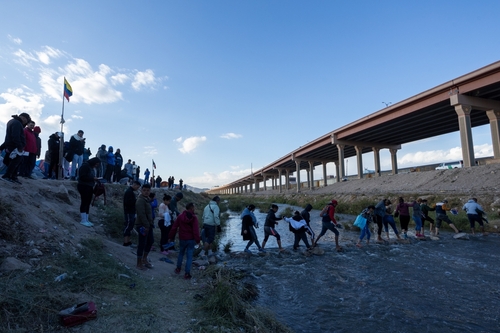
In a move that has escalated tensions between the federal government and the state of Texas, the Biden administration has filed an emergency application with the U.S. Supreme Court. The request seeks permission for border agents to dismantle razor wire barriers that have been installed by Texas along the Rio Grande River. These barriers are part of a broader initiative by Texas to curb illegal immigration and enhance security at the southern border.
Governor Greg Abbott of Texas has issued a resolute response to the federal government’s actions, vowing to continue the state’s efforts to protect its border. Abbott’s stance reflects a commitment to state sovereignty and the enforcement of immigration laws, which he argues are being undermined by the current administration’s policies.
REPORTER: "Are you gonna do anything about the southern border, Mr. President?! … Record number of migrants!"
BIDEN: "Well, we gotta do something…"
*shuffles inside* pic.twitter.com/RmyWuOBrBu
— RNC Research (@RNCResearch) January 3, 2024
The conflict arose after Texas implemented measures, including the installation of razor wire near Eagle Pass, to slow the influx of illegal immigrants into the state. According to state officials, the surge in illegal crossings has led to increased crime, property damage, and a drain on state resources. In response to these challenges, Texas launched Operation Lone Star, which includes busing migrants to sanctuary cities and arresting those who trespass.
However, the federal government’s position is that Border Patrol agents require unimpeded access to the border regions to perform their duties effectively. The Department of Justice contends that federal law grants agents the authority to access private land at the border and that Texas cannot obstruct them from carrying out their responsibilities.
Joe Biden's America: "Got-Away" Illegal Aliens Crossing Open US Border Are Caught on Camera CARRYING RIFLES | The Gateway Pundit | by Jim Hoft
Joe Biden’s America: He is working to take your firearms as illegal aliens walk across the open border carrying their own rifles FOX News… pic.twitter.com/OBqGRVdyKc— Gitmo (Health is a Wealth) 🇺🇸🇮🇱 (@Gitmo99) December 27, 2023
The legal battle intensified when Texas Attorney General Ken Paxton sued the federal government after Border Patrol agents cut through some of the state-installed razor wire last October. Paxton argued that this action not only destroyed state property but also compromised security. Although a federal judge initially declined to impose an injunction against the federal government, the conservative Fifth Circuit Court of Appeals granted Texas a temporary victory, ordering agents to halt the practice while legal proceedings continued.
The administration’s recent filing with the Supreme Court represents a counterstrike, challenging the appellate court’s decision. U.S. Solicitor General Elizabeth Prelogar argued in the court filing that Texas has no right to impede federal agents from performing their duties, setting the stage for a high-stakes legal showdown.
Governor Abbott has taken to social media to express his defiance, stating that Americans and the courts will reject what he describes as the administration’s hostility toward immigration laws. He has also reaffirmed Texas’ commitment to deploying the National Guard to build border barriers and repel illegal immigrants.
As the legal battle looms, the situation at the border remains a contentious issue. With both sides standing their ground, the Supreme Court’s decision could have significant implications for federal-state relations and the future of immigration enforcement in the United States.












